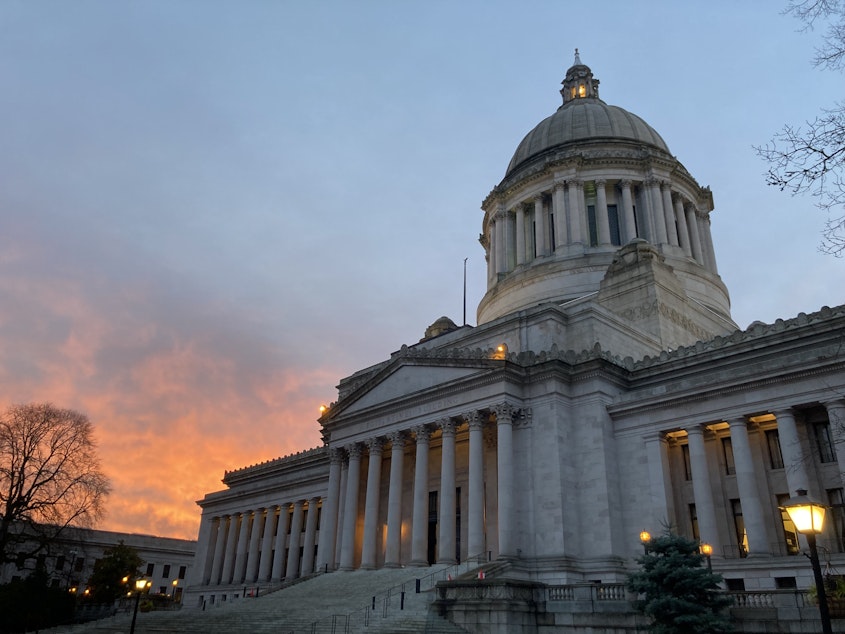Inslee orders delay in collection of new long-term care tax from workers

Washington Gov. Jay Inslee and Democratic leaders in the Legislature announced Friday a delay in the collection of a payroll tax to pay for a new long-term care insurance benefit for workers.
The new $0.58 per $100 of earnings premium — or about $435 a year for someone making $75,000 — was scheduled to kick-in on January 1. Instead, Inslee will instruct the state’s Employment Security Department not to collect the premiums from employers before they’re due in April.
When the Legislature returns to Olympia in January, Democratic leaders have signaled they intend to pass a law that formally delays the collection of the new payroll premium until after the 2023 legislative session.
The more than year-long pause will give lawmakers time to make tweaks to the long-term care insurance program during the 2022 session, and consider further changes during the 2023 session after the state’s Long-Term Services and Supports Trust Commission provides further data and recommendations.
The commission issued an initial set of recommendations this month.
“Delaying implementation of the Washington Cares Fund premium assessment through the 2023 legislative session allows the Legislature time to pass the policy reforms that are ready to go now and to consider further recommendations from the Long Term Care Commission,” said Speaker of the House Laurie Jinkins and Senate Majority Leader Andy Billig in a joint statement.
Since lawmakers approved the WA Cares program in 2019, a number of concerns about how the benefit will work have surfaced.
Among those concerns is that people who work in Washington, but live in a border state like Oregon are currently on the hook to pay the premium, but not benefit from the program because only Washington residents qualify.
Another problem lawmakers are likely to address during the 2022 session is that workers nearing retirement won’t have enough time to vest in the program and therefore won’t qualify for any benefits.
Under WA Cares, workers who contribute to the program for at least 10 years without a break of five years or more, or those who have contributed for three of the past six years will qualify for up to $36,500 in long-term care services beginning in 2025.
In order to qualify for the benefit, eligible workers would have to demonstrate they need assistance with at least three activities of daily living like bathing, toileting and eating.
It's estimated that seven in 10 Washingtonians will need some form of long-term care in their lifetime.
Lawmakers next year are also expected to address eligibility concerns for disabled veterans, military spouses and people working in Washington under a temporary, non-immigrant visa. A likely solution is to let these workers, as well as out-of-state residents, opt-out of the program.
For those approaching retirement, there’s been discussion of making them eligible for a prorated benefit. Another option would be to allow them to continue paying into the program after they retire.
Earlier this month, Democratic leaders in the state Senate wrote Inslee a letter urging him to delay implementation of WA Cares for a year. Inslee said he didn’t have the authority to do that under his COVID-19 emergency powers.
But he did say he might be able to instruct the state Department of Revenue to temporarily delay the collection of the tax – which is the route he’s now taking.
“I’m sensitive and empathetic to the need for some changes in this bill,” Inslee said at the time.
In anticipation of Friday’s announcement, advocates of the program called on lawmakers to “work quickly to improve and strengthen” the program.
“The sooner we implement WA Cares, the sooner Washingtonians will get long-term care, relieving their financial and emotional worries,” said Cathleen MacCaul of AARP Washington in a statement.
Meanwhile, Republican lawmakers have already pre-filed bills to repeal the WA Cares program. And other critics are collecting signatures for an initiative that would allow people to opt-out of the tax.
Under a change in the law earlier this year, Washington residents who purchased a private long-term care insurance plan by November 1 were allowed to opt-out of WA Cares if they request to do so by the end of 2022.
As of December 7, the state had received more than 442,000 opt-out applications, representing about 36 percent of the state’s wages, according to a recent presentation prepared by the state actuary. That’s four-times higher than the baseline assumption of how many people would opt-out, but it’s also significantly lower than what modelers considered a “high scenario” of 1.5 million opt-outs.
The implications of the opt-outs to the solvency of the program have not yet been determined. It’s also unclear if the current $0.58 tax rate will ultimately prove sufficient or have to be increased.
About three million Washington workers are expected to pay into the WA Cares program. Employers will collect the premium from their employees. Self-employed workers have the option to opt-into the program.
Even with Inslee’s instruction to the Employment Security Department to not collect the tax from employers in April, it’s possible some employers will still deduct the tax from their workers’ checks beginning in January. If that happens, Democratic leaders in the Legislature are expected to create a mechanism for those premiums to be refunded.
“While we cannot direct employers not to collect, we strongly encourage them to pause on collecting premiums from employees, giving us time to pass legislation extending implementation dates until next year,” Jinkins and Billig said in their joint statement. [Copyright 2021 Northwest News Network]




